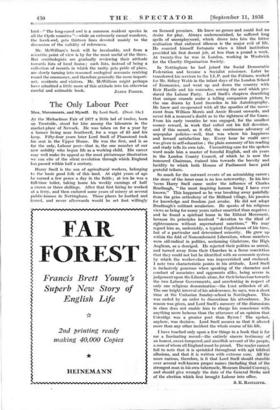Men, Movements, and Myself. By Lord Snell. (Dent. I8s.)
The Only Labour Peer
AT the Michaelmas Fair of 1877 a little lad of twelve, born on Trentside, stood for hire among the labourers in the market-place of Newark. He was taken on for a year by a farmer living near Southwell, for a wage of £5 and his keep. Fifty-four years later Lord Snell of Plumstead took his seat in the Upper House. He was the first, and is so far the only, Labour peer—that is, the one member of our new nobility who began life as a working child. His career may well make its appeal as the most picturesque illustration we can cite of the silent revolution through which England has passed within half a century.
Harry Snell is the son of agricultural workers, belonging to the basic good folk of this land. At eight years of age he earned a few pence a day in the fields ; at ten he was a full-time toiler, taking home his weekly earnings of half a crown or three shillings. After that first hiring he worked at a ferry, and then endured some years of misery at several Public-houses in Nottingham. Those places he loathed and feared, and never afterwards would he set foot willingly on licensed premises. He knew no games and could feel, no desire for play. Always undernourished, he suffered long spells of unemployment, which drove into him the bitter realisation that enforced idleness is the major evil of life. He counted himself fortunate when a blind institution provided his first decent job, at less than a pound. a week. At twenty-five he was in London, working in Woolwich for the Charity. Organisation Society.
In Nottingham he had joined the Social Democratic Federation and become a Socialist missioner. Later he transferred his services to the I.L.P. and the Fabians, worked for Mr. Sidney Webb in the infant days of the London School of Economics, and went up and down the country with heir Hardie and his comrades, sowing the seed which pro- duced the Labour Party. Lord Snell's chapters describing that unique crusade make a telling companion picture, to the one drawn by Lord Snowden in his Autobiography. He knew and co-operated with all the apostles of the move- ment from William Morris and Annie Besant onwards, and never felt a moment's doubt as to the rightness of the Cause. From his early twenties he was engaged, for the smallest money reward, in work that called out his full devotion, and if this meant, as it did, the continuous advocacy of unpopular policies—well, that was where his happiness and inward satisfaction lay. Every hour he could save was given to self-education ; the plain summary of his reading and study tells its own tale. Unremitting care for the spoken word made him a master of forceful English, and six years in the London County Council, of which he is now the honoured Chairman, trained him towards the brevity and lucidity to which both Houses of Parliament have paid grateful tribute.
So much for the outward events of an astonishing career ; the story of the inner man is no less noteworthy. In his late 'teens Harry Snell came under the influence of Charles Bradlaugh, " the most inspiring human being I have ever known." This happened as he was breaking away painfully from the grim orthodoxy of the Midland village, his passion for knowledge and freedom just awake. He did not adopt Bradlaugh's militant secularism. He speaks of his religious views as being for many years rather unsettled than negative ; and he found a spiritual home in the Ethical Movement, because its principles involved " devotion to the ideal of righteousness without supernatural sanctions." We may regard him as, undeniably, a typical Englishman of his time, but of a particular and determined minority. He grew up within the fold of Nonconformist Liberalism, whose members were old-radical in politics, acclaiming Gladstone, the High Anglican, as a demigod. He rejected their politics as unreal, and turned away from their Churches in a fierce conviction that they could not but be identified with an economic system by which the worker-class was impoverished and enslaved. I note two characteristic points in his attitude. Lord Snell is inclusively generous when speaking of the character and conduct of associates and opponents alike, being severe in judgement upon the Liberals alone, for their behaviour towards the two Labour Governments, and unrelenting in respect of only one religious denomination—the least orthodox of all. The one bright interval of his adolescence, he says, was a short time at the Unitarian Sunday-school in Nottingham. This was ended by an order to discontinue his attendance. No reason was given, and Lord Snell's memory of the discu.ssions in class does not enable him to charge his conscience with anything more heinous than the utterance of an opinion that Coleridge was a greater poet than Byron ! The upshot, anyhow, was decisive. Lord Snell assures us that it altered more than any other incident the whole course of his life.
I have touched only upon a few things in a book that is for me a fascinating record—the entirely sincere testimony of an honest, sweet-tempered, and unselfish servant of the people, a man of whom all England must be proud. The reader cannot fail to note that it is sprinkled throughout with apt biblical allusions, and that it is written with extreme care.. All the more curious, therefore, is it that Lord Snell should stumble over several well-known proper names (including that of the strongest man in his own tabernacle, Moncure Daniel Conway), and should give wrongly the date of the General Strike and of the election which first brought Labour into office.
S. K. RATCLIFFE.












































 Previous page
Previous page